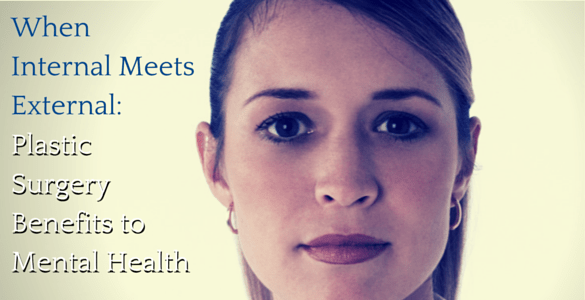
With “did she or didn’t she” pictorials splashed across supermarket gossip rags and entire television series dedicated to plastic surgery as a way to tweak physical appearance for purely aesthetic reasons or in hopes of chasing some nebulous beauty ideal, it’s easy to forget that the many procedures that exist under the umbrella of plastic surgery aren’t simply for nose tweaks and lip plumping.
While there is certainly no shame in “gilding the lily,” so to speak, and emphasizing one’s inner beauty using procedures that buff, augment or reduce what nature has given us, plastic surgery has benefits far beyond those easily recognized by sight. For many, a trip to their doctor’s office is not just about outer beauty but also regaining ground mentally and emotionally.
Plastic surgery is a portal to holistic health, where sometimes changing the external is a mere means to transforming the internal. Some studies have shown that the long-term psychological and emotional outcome following surgery depends at least partially on the patient’s frame of mind prior to the procedure.
One such study conducted by experts at the University of Basel and reported in the Clinical Psychological Science journal evaluated 550 patients planning to undergo cosmetic surgery. Prior to their procedures, patients were asked what they hoped to achieve; those who listed realistic outcomes related to better self-confidence and overall improved quality of life (versus patients who expressed unrealistic wishes for completely different lives or the disappearance of all their problems) reported less anxiety, more self esteem, and overall a healthier, happier existence.
“People undergoing plastic surgery just want to look normal–that is, they don’t want to stand out in an obvious way or to have features which cause comment or make them feel self-conscious.”
There’s a similar study courtesy of David Sarwer, PhD, who (among other notable positions) is an associate professor of psychology at the University of Pennsylvania School of Medicine’s Center for Human Appearance. Dr. Sarwer found that of his patient group, a staggering 87 percent reported feeling better about the body part that was operated on as well as improved body image overall. Best of all, perhaps, was their reports of less negative body emotions in relation to social situations.
In other words, for these patients, their procedures made it easier and even more enjoyable to go out in public and interact with others. It’s easy to see how those improvements could translate into better opportunities not just for interpersonal relationships but also for self-love and even professional advancement.
According to Susan Thorpe, a psychology lecturer at the University of Surrey and cosmetic surgery researcher, people undergoing plastic surgery just “want to look normal – that is, they don’t want to stand out in an obvious way or to have features which cause comment or make them feel self-conscious. They also want their physical appearance to be more in line with their personalities and feel that they want all the bits of their bodies to match.”
It’s a sad but widely acknowledged fact that being “different” is not just damaging to self esteem but it also puts people, teens especially, at risk of being mocked or bullied for daring to look different from their peers. The National Bullying Prevention Center found that nearly 1 in 3 students reported being bullied in 2013; another study cited by the center found that only 64 percent of children bullied actually reported it.
Erica Morgo, a high school senior interviewed by ABC News, knows how it feels to be taunted due to perceived imperfections. In sixth grade, Erica was so severely harassed by classmates over her “big nose” that she suffered from depression and missed nearly a month’s worth of school. Ultimately, the teen tried to break her nose against a door, causing her mother to realize that something had to be done. The answer for Erica Morgo was rhinoplasty and a much happier time in high school. For thousands of teens like Erica, plastic surgery isn’t simply a band-aid but rather a way to reclaim confidence and remove barriers that could otherwise influence their ability to make friends and even graduate school.
For some patients, the physical source of dissatisfaction isn’t genetic but rather traumatic. Military veterans wounded in combat are turning to plastic surgery in hopes of reconstructing everything from facial lacerations to severely injured or even amputated limbs. Faces of Honor offers veterans with face, head or neck injuries access to pro-bono medical services in hopes that cosmetic surgery will have positive impact on each patient’s ability to transition back to civilian life. By repairing external damage, plastic surgery can help to minimize the daily visual reminder of past trauma, and for those who might not want such a conspicuous symbol or who dread being asked about its origin, these procedures can offer a priceless way to move forward.
There are non-military casualties of war who benefit from plastic surgery, too. The story of 18-month-old Teeba Fadhil is a powerful example. Teeba was riding in a taxi in Baghdad in 2003 when it was hit by an IED, killing her three-year-old brother instantly and leaving Teeba in the hospital for more than two months, suffering from significant scarring due to burns on her hands and head. Eventually, a charity organization heard of Teeba’s plight and brought her to University Hospital in Cleveland, and to Dr. Arun Gosain. Dr. Gosain’s painstaking reconstruction of Teeba’s face and hands gave a young girl a second chance at a normal life. When she’s asked about her lingering injuries, as recovery marches on, she says, “I’m growing my new face.”
Plastic surgery is a monumentally personal choice. Other than in situations in which the patient is suffering from body dysmorphic disorder (BDD) or other reason’s calling for outside intervention by an objective third party, the choice regarding whether or not to undergo a cosmetic procedure should be the patient’s and the patient’s alone, with the understanding that in many cases patients’ goals aren’t just a smaller nose or smoother skin, but rather a chance to face the world feeling – and, yes, looking – the way they were meant to.



